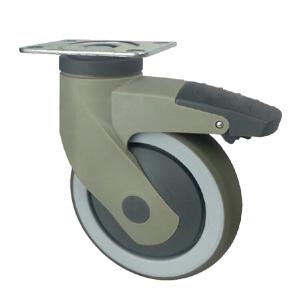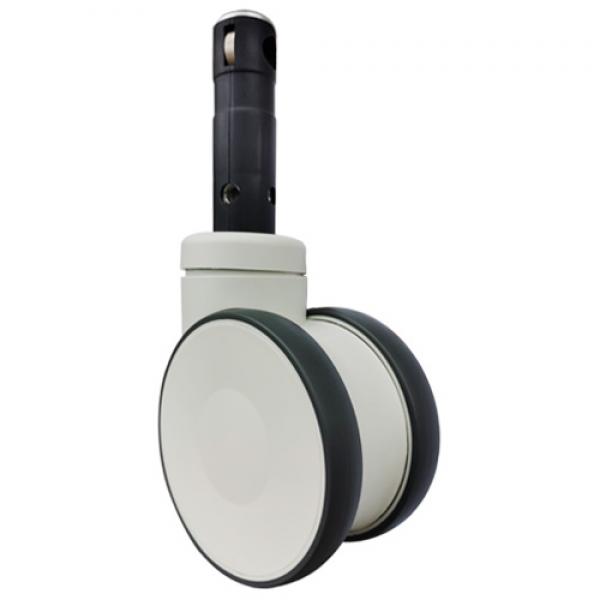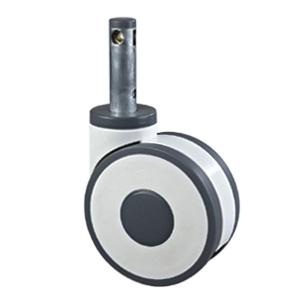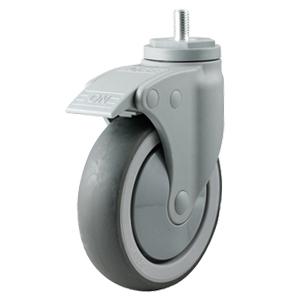Why We Need The Quiet Hospital Caster?
If you work at a hospital, clinic or other type of healthcare facility, you know all about the problem of noise.
All parties involved, including patients, doctors, nurses, and visitors, share the common sentiment that the sounds of alarms, alerts, beeps, and loudspeaker pages can be bothersome and disruptive during hospital visits.
Hospital noise is such a major issue for patients that the annual Hospital Consumer Assessment of Healthcare Providers and Systems (HCAHPS) Survey dedicates 3 questions specifically just to noise.
Yearly surveys consistently reveal that excessive noise in hospitals remains a primary grievance among patients, staff, and visitors. The results indicate that the source of the problem goes beyond alarms and loudspeakers, as the casters on material handling systems used in healthcare facilities are a significant contributing factor to the ambient noise.
We are referring to various types of carts that are often seen on healthcare facility floors, such as laundry carts, IV poles, mobile workstations, and food service delivery carts. These carts often have poor quality casters, which make a lot of noise.
Replacing these commodity casters with quieter casters reduces the level of noise in your healthcare facility. And is likely to boost your HCAHPS Scores. Here’s how.

Why Most Hospital Casters Are Noisy
Casters make a lot of noise for a number of reasons, some of them to do with their quality, others to do with their design, and others to do with their construction.
Most manufacturers of rolling furniture, such as carts, IV poles, and mobile workstations, commonly used in hospitals and healthcare facilities, opt for low-grade casters to keep their production costs low. However, these inexpensive casters tend to be of inferior quality, resulting in increased noise levels.
Another thing that makes hospital casters noisy is that they have often have wheels using improper tread material. Wheels made from hard rubber, for example, cannot absorb and distribute impact, making caster wheels noisy when rolling.
Another factor contributing to the noise issue is the design of the casters themselves. Original equipment manufacturers (OEMs) often incorporate a standard swivel lead caster design, which refers to the distance between the center of the top plate and the center of the axle. This design flaw is responsible for the rattling and shaking commonly experienced with carts in healthcare settings.
Another cause of noise is casters that have no bearings at all. The majority of casters on most OEM carts lack bearings altogether. In their place is a metal axle that grinds on the plastic core of the wheel as the wheel rotates, producing noise.
Look for wheels made from high-quality material such as polyurethane (like CC Apex). These wheels store and exude energy to reduce noise-causing vibrations. In the process, they deliver a smooth and quiet ride.

Qualities of Quiet Hospital Casters
In the event that the casters on your hospital equipment, such as carts, IV poles, and mobile workstations, are excessively noisy, it is crucial to replace them with quieter alternatives. When searching for suitable replacement casters, consider three key factors: the appropriate wheel material, proper bearings, and an extended swivel lead caster design.
Look for wheels made from high-quality material such as polyurethane. These wheels store and exude energy to reduce noise-causing vibrations. In the process, they deliver a smooth and quiet ride.
Also look for casters that feature sealed precision bearings. Quality bearings distribute loads, reduce friction and reduce noise.
Extended swivel leads allow the caster to trail properly, eliminating the chatter and flutter, and drastically reducing the noise within the facility.
Shop Quiet Medical Casters Here
xxxx
Results to Expect by Installing Quiet Hospital Casters
By replacing your noisy casters with those that feature the appropriate wheels and high-quality bearings, you can expect to experience a noticeable reduction in the noise level throughout your healthcare facility. The noise generated by the casters should decrease significantly following the replacement.
You should also expect to notice that your patients are resting and sleeping better, and that their improved sleep enhances their patient experience overall.

Conclusion
This brings us back to the importance of HCAHPS scores. After replacing your noisy commodity casters with quiet ones, you should begin to see improvements in your noise-related HCAHPS scores. It is important to keep in mind that the HCAHPS survey includes questions that pertain to the noise levels within your facility, as perceived by your patients.
When noise is the top complaint among your patients, making your casters quieter is bound to improve the patient experience—and increase your HCAHPS Scores.
By the way, our CC Apex Wheels are instrumental in reducing noise levels in healthcare facilities. Read our case study on Making Hospital Carts Quieter and More Ergonomic.
Other Post
2 Products, Multiple Solutions For Medical Environments
In hospitals and other medical environments, it is crucial to have casters and wheels that are not only quiet and ergonomic but also possess anti-microbial properties. To fulfill these requirements, we proudly present our exceptional range of CC Apex casters and a dedicated line of anti-microbial wheels, designed specifically to meet all your needs.
We invite you to explore our informative case study below, which highlights the reasons why the CC Apex casters are an excellent choice for those seeking decibel reduction. Additionally, it provides detailed insights into the attributes of our anti-microbial wheels.
Cc Apex: Ergonomics And Noise Reduction For Hospitals
Hospitals are continuously seeking ways to enhance the comfort of their patients, and an important aspect of patient comfort is the noise level in their environment. Although it may not be the most obvious consideration for noise control, the selection of appropriate casters and wheels plays a crucial role in a hospital setting.
Before working with Caster Connection, the patients and staff of an Ohio hospital complained that maintenance carts made a lot of noise through the halls. Furthermore, the wheels in use made the carts difficult to move. When the hospital implemented the use of harder wheels in an attempt to reduce the force needed to push and pull, the noise level increased.
A noise-reduction committee at the hospital contacted Caster Connection for help. Using his years of experience and knowledge of the industry, a Caster Connection Regional Solutions Manager suggested the implementation of the quiet, ergonomic CC Apex line of wheels in the hospital’s operations.
Anti-Microbial Casters And Wheels
Our anti-microbial wheels, thread guards, and forks are manufactured using a specialized compound that is specifically designed to inhibit the growth of various harmful bacteria, molds, mildew, and fungi. These components are engineered to be highly effective against microbes throughout the entire lifespan of the wheel.
Anti-microbial wheel protection is not a coating on the surface of the wheel, thread guard or fork. Abrasions, chips or scratches will not impact the effectiveness of the anti-microbial properties in any way because the agent remains stored in the polymer and is gradually released to the surface of the wheel. Not even wax buildup on the wheel can impair the bacteria fighting performance.

